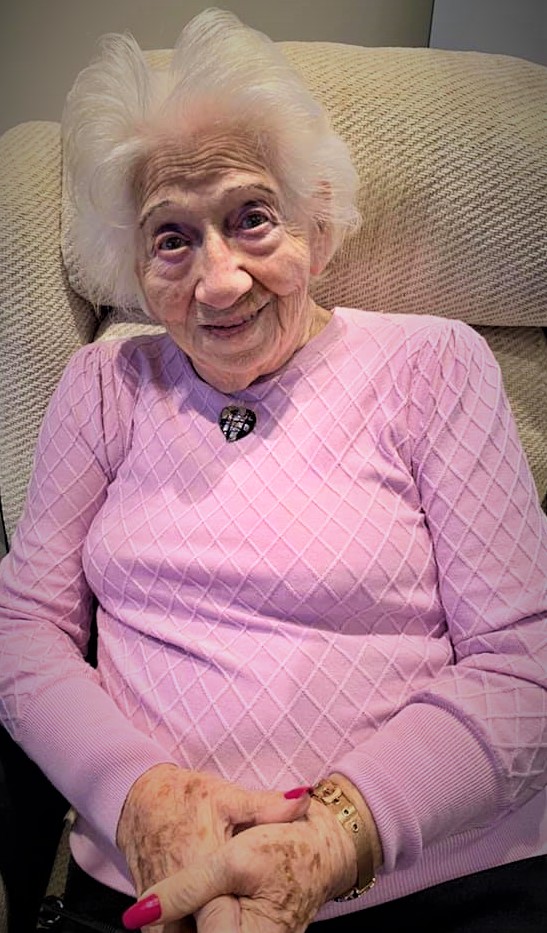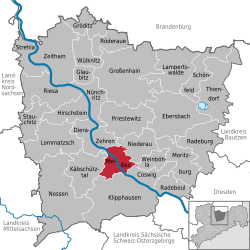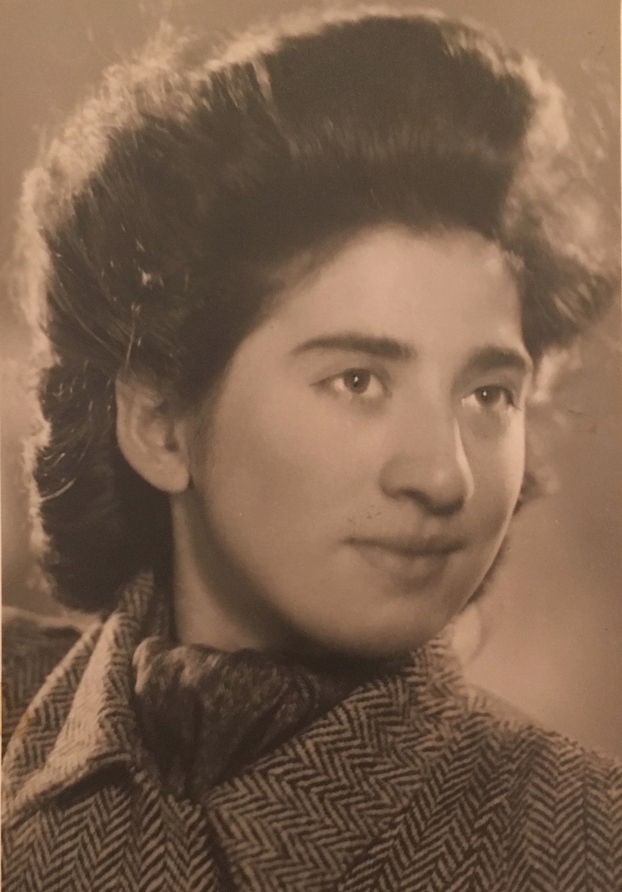A Woman of Valour: My Tribute to the Irrepressible Judy Benton

1921 – 2021
Professor Joe Goldblatt
The sun was brightly shining upon my friend David Benton’s azure blue swimming pool as he led me over to meet his mother who was visiting from London. I first remember how she carefully looked me up and down and then extended her hand and said with a sparkling smile, “Hello, I am Judy.”
The moment that Judy took to carefully examine me before extending her hand may have been an instinct that was well developed due to her dramatic escape from Nazi Germany in the late 1930’s.

in 1938 Judy had returned home from school in Meissen, Germany, a city in Eastern Germany near Dresden, only to be told by neighbours that her parents and sister had been arrested and that she must now leave as quickly as possible or the Gestapo would return for her as well. She quickly packed a small suitcase and collected some money and made her way to a nearby synagogue. There she learned that she should immediately go to Leipzig where a Kindertransport train would soon be departing.
Judy’s life before the war was a happy one with her father managing a small factory and Judy excelling in school. However, once the war began, she was soon ostracised by the other children at school and one of her teachers even brought in a poster to show the pupils how to recognise a Jew. Despite being a top student, Judy was not allowed to receive the first place award in her class. One day, in yellow paint, the words “Here sits a dirty Jewish girl” was scrawled upon her desk top.

Within the chaos of this time, there was one small glimmer of hope. The Kinderstransport programme was responsible for rescuing thousands of children during World War II by transporting them to the United Kingdom for safeguarding. Judy, at the age of seventeen, was actually too old to qualify for this programme, however, she used her clever and creative brain to escape.
When she arrived upon the train platform in Leipzig she found a cacophony of noise, shouts, cries for help from hundreds of children boarding the train. A mother quickly pushed her young daughter into Judy’s arms and asked her to provide care. Judy immediately went to a local costume shop and purchased a nurses uniform and returned to the train while telling the officials that she was the nurse of the child that had been placed in her arms and therefore she must travel with her. A few minutes later the train pulled out of the station and Judy and the other young people were making their way to the United Kingdom.
According to records from World Jewish Relief, upon arrival in Liverpool Judy was immediately sent to an agricultural training centre, perhaps to prove that she was in training to be able to go to Palestine and therefore only needed temporary refuge in Britain. Because Judy had arrived without a personal guarantor (host family or organisation), this would be the only way she could remain. Whilst studying at the agricultural college she met her future husband and they began their lives in England.
During the war years Judy was able to find work sewing uniforms for soldiers. Years later, she would use her sewing skills to sew blankets an other items for poor Jewish communities in Europe. She said that it was difficult being both German and Jewish because the English did not trust the Germans and did not believe her when she said that her parents had been sent to a concentration camp. According to Judy “They thought I was spreading propoganda.” She later discovered that her parents had tragically perished in Auschwitz along with millions of other Jews.
Judy and her husband worked at various jobs just to survive during and following the war years. She gave birth to two children, David and Ruth and continued to do whatever she could to aid European Jewry. “I have been invited three different times to Meissen and the last time the Mayor asked me if I still hated them?” She carefully chose her words in responding to the Mayor’s question when she firmly said ” No. Hatred is an illness, it is not worth holding on to. All I ask is that it never happens again.”
Following my initial meeting with Judy, we corresponded with one another and later when I was offered a teaching post in Scotland I was able to stay in closer touch with my new friend. During one visit to London, Judy invited me to her flat for tea and then I joined her extended family for a Chanukah dinner. Despite being in her late eighties, Judy prepared an immaculate tea for me and began to question me about my views of Scotland, the United Kingdom and even global politics. I was more and more impressed with her keen intelligence and her continuing interest in world affairs, even at an advanced age.
Another time Judy’s son and daughter invited my wife and I to join them and other family and friends to celebrate her ninetieth birthday. I rang up Judy and asked her what she would like from Scotland for her birthday and she said “My only dream is to publish my children’s book.” Judy had written a story book for children about her time in the Kindertransport and was seeking a publisher.
And this is how I became the publisher of Judy’s book. Her son paid for the printing and I organised the design as well as edited the manuscript. My wife and I loaded 100 books into our suitcase and made our way to Golders Green, one of London’s many boroughs. Within Golders Green there is a senior centre for holocaust survivors. At first we had difficulty finding the centre amongst the many Jewish delicatessans, markets and other businesses. To my distress, none of the business owners seemed to even know it existed.
Finally, Judy’s son saw us wandering upon the pavement and stepped through the doorway to welcome us. We immediately displayed a large poster that announced “Meet the Author: Judy Benton Book Signing Today!” Judy asked me what all the fuss was about and I told her that today, her book had finally been published and now she would need to sign copies for all of her friends and family. She was thrilled.
As she came to the end of her book signing and following the singing of “Happy Birthday” she signalled that she wanted to speak with me privately. I sat next to her and she asked me “So, who actually published this book?” I decided to tell a small white lie and said “Random House in New York City.” She nodded approval and then said “Please tell them I have several more books I want them to publish.” I nearly fainted!
The next year our University once again marked the 1947 liberation of Auschwitz on 27 January with a Holocaust Remembrance Day ceremony. I was asked to provide a speaker and I immediately thought of Judy. By then she was unable to travel the great distance to Scotland and I asked her if she could join us via teleconference. She agreed and to my eternal amazement, Judy organised and opeprated all of the complex technology herself and provided a deeply inspiring presentation for our students and colleagues.
A few years later I found myself in London again and I invited Judy and her daughter to lunch to celebrate her ninety – seventh birthday. I asked her daughter to suggest a restaurant that Judy liked and would be comfortable for her to travel to. On the day of her luncheon, I arrived early and told the head waiter that this was a special luncheon and when he asked who was the guest of honour I told him it was Mrs Judy Benton. His eyes widened, he smiled broadly and said, “Leave it to us. Mrs Benton is one of our favourites.”
When Judy and her daughter arrived you would have thought she was Dolly Levi arriving at the Harmonia Gardens in the musical “Hello Dolly!” The waiters all bowed, told her how well she looked and the service was exemplary. I will long cherish and always remember how much fun we had at that long and laughter filled luncheon with Judy shamelessly flirting with the staff.
Recently, Judy’s grandaughter asked me if I would record a short video greeting in honour of her grandmother’s one hundredth birthday. I was, of course, delighted and told her how meeting her had so enriched my life. What I failed to tell her was that the she was one of those unique humans whose very name made me suddenly and unconrtollably smile from ear to ear.
Sadly, shortly after her one hundredth birthday, Judy died. Surprisingly to me, despite my great sadness over the deep sense of loss of my friend, I am smiling as I write this tribute. My smile is motivated by my having witnessed the ability of one human being to use her brain, her creativity, her compassion for others and her hard work to prove that good may indeed triumph over evil.
It is written in the Book of Proverbs 31 that “A woman of valour who can find? For her price is far above rubies.” And so it is with my friend Judy Benton whose life is a priceless inspiration to me, my family, and thousands of others throughout the world. Each time I smile in memory of her remarkable life, I hope someone sees my moment of joyous remembrance and takes some further happiness from me just as I and many others were gifted from the truly irrepressible and now immortal, Judy Benton.
Professor Joe Goldblatt is Emeritus Professor of Planned Events at Queen Margaret University in Edinburgh, Scotland.

What a wonderful tribute thankyou so much love ruth.
My pleasure. Her life shall be a blessing for all time.
Lovely heartwarming tribute to an impressive woman.
Hi
I am finally completing the writing of a book about wonderful Jewish nonagenarians, of whom Judy Benton (who I had the pleasure of interviewing) was one. My proof-reader has identified a bit of a gap between arriving in England and 1945. Could David or Ruth help with a paragraph here?
I am sure they would be happy to help. Both are on Facebook.